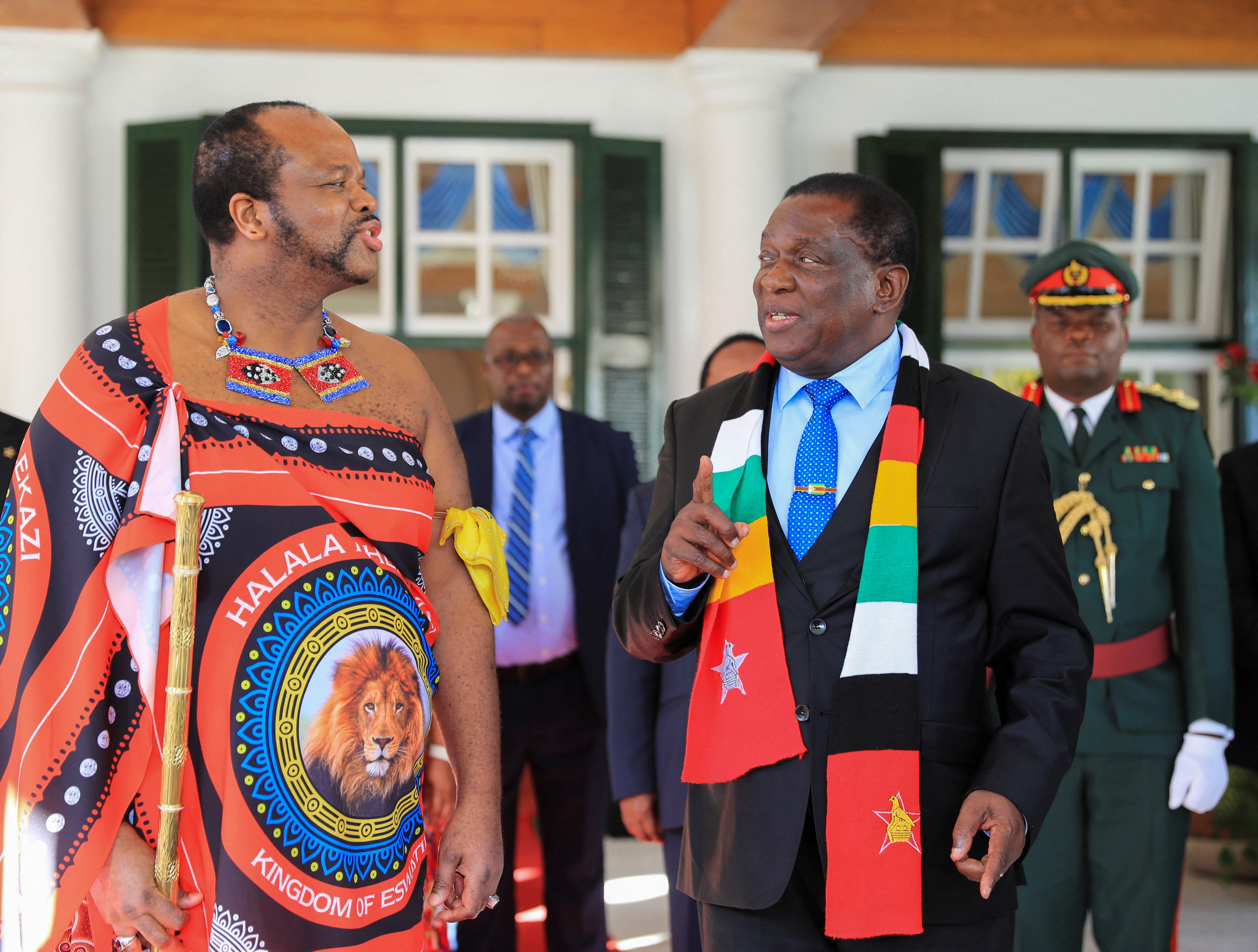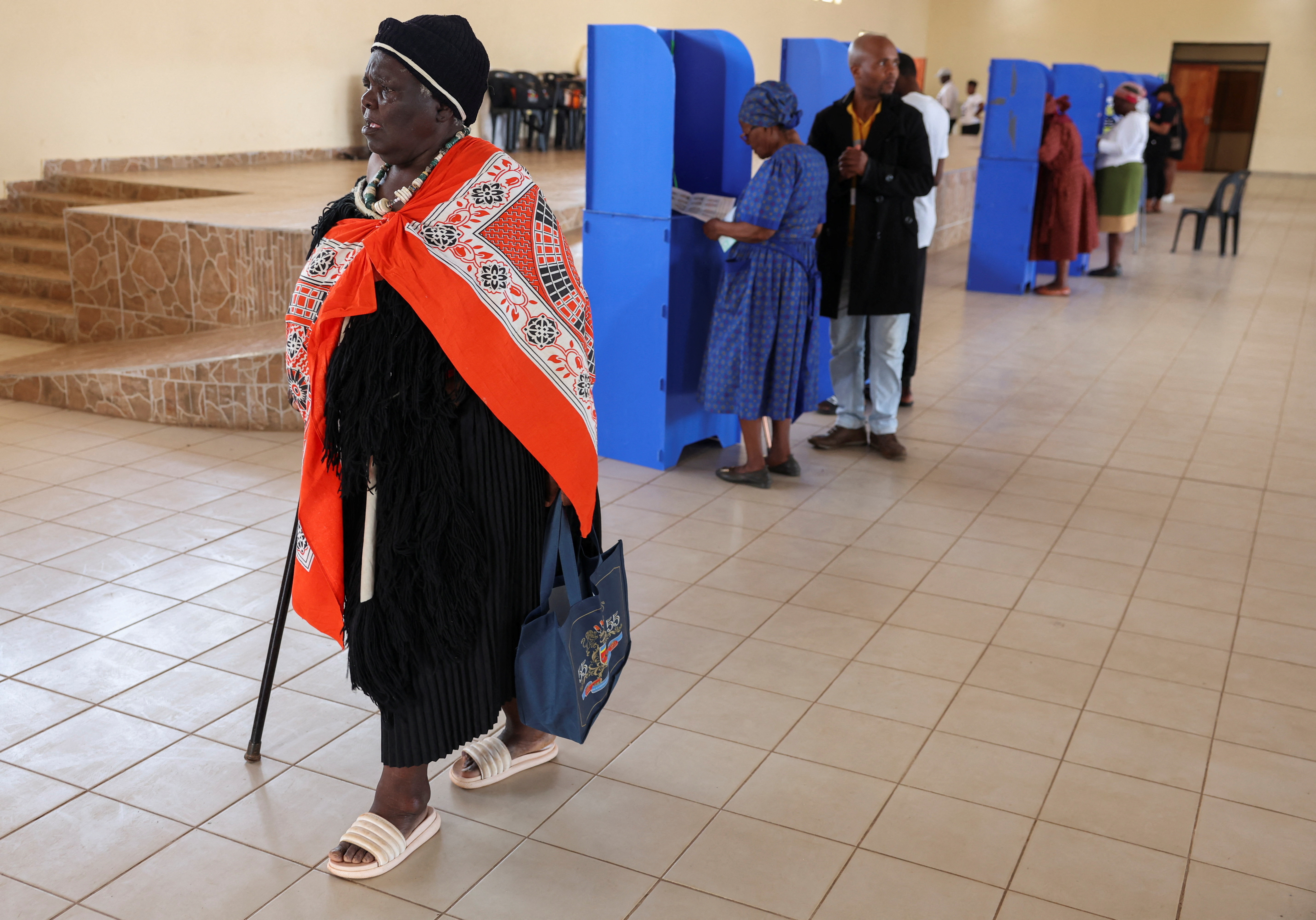
The first time Maxwell Dlamini was arrested, he was 21 years old.
It was April 2011, and the marketing student was at a demonstration in Mbabane, the capital of Eswatini, formerly known as Swaziland and considered by many to be the last absolute monarchy in Africa.
Dlamini was out campaigning for democratic reforms, but the state saw it another way. They argued he was trying to overthrow the government, classified him as a dangerous political prisoner, and held him in a maximum security prison where he faced months of harassment, solitary confinement, and torture.
“I was kept in isolation for the longest time, not interacting with any other inmates,” Dlamini told Al Jazeera. “I was denied the right to write my exams, so I ended up not finishing and was expelled from university … At some stage, while I was in prison, I also had a stroke.”
Just shy of a year behind bars, an international human rights campaign helped secure bail and his release. But his freedom was short-lived. From 2012 to 2014, he was arrested twice more – once for criticising the king’s lavish birthday party while Swazis live in poverty and once for attending a May Day workers’ rally.
For his actions, he was charged with sedition and “terrorism”, and more than a decade later, his court case is still pending. At the same time, the People’s United Democratic Movement (PUDEMO), which he is deputy secretary general of, remains a banned organisation in a country where political parties are illegal.
Meanwhile, Dlamini is receiving psychosocial support after his ordeal. “I have episodes and flashbacks,” he said. “I still feel like I’m in a box, so I have to sleep with the lights on.”
Monarchy
Eswatini, the small Southern African kingdom of 1.2 million people, has been governed by King Mswati III for 37 years after he took over from his father, who had ruled since the country gained independence from Britain in 1968.
Tensions have been high there in recent years, especially since a crackdown on mass pro-democracy protests in 2021 killed dozens of people, and calls for greater transparency and real democratic reform have grown.

Eswatini considers itself a constitutional monarchy. “We are a kingdom that subscribes to constitutionalism, to the rule of law, to democracy and to all international norms of human rights and good governance,” government spokesperson Alpheous Nxumalo told Al Jazeera.
But rights activists and pro-democracy groups said that in practice, it’s an absolute monarchy where the king reigns over all else.
According to the 2022 Freedom in the World report, which tracks global trends in political rights and civil liberties, “The king exercises ultimate authority over all branches of the national government and effectively controls local governance through his influence over traditional chiefs. Political dissent and civic and labor activism are subject to harsh punishment under sedition and other laws.”
‘A sham’
In late September, the country held elections to elect 59 members of parliament. Because the Eswatini constitution bans political parties, only individuals can stand for election.
Some political movements like PUDEMO have been fighting for collective recognition and decline to participate on an individual basis.
“It will be politically fraudulent and an outright selling of our soul for us individually [to participate in the election],” Wandile Dludlu, PUDEMO’s deputy president, told Al Jazeera, calling the banning of political parties “illegal and irrational and unconstitutional”.
“These elections elect parliamentarians that do not make up government,” Dludlu said. “They don’t make up the government because government in this country is appointed – 100 percent appointed by the king – from the prime minister to the last minister.”
Other political parties agreed.
“All these things are just a sham because there is nothing you can do in parliament to change anything as a member of parliament because the king is above everything. He owns the judiciary, the legislature and also the executive,” said Nombulelo Motsa, the head of the Economic Freedom Fighters (EFF) party in Eswatini.
“It’s just a ritual actually to have these elections. It’s a five-year ritual. You [as a member of parliament] go in there, you work for him, you get paid and you leave after five years.”
‘To stifle dissent’
Critics noted that the wealthy king owns big interests in the telecommunications industry, transport, hospitality, mining and real estate. He lives a lavish lifestyle while nearly a third of the population of Eswatini lives below the poverty line.
“There is not a single parliament who has challenged that,” Dludlu said. “There is no parliament that has been able to redirect money from useless vanity projects that the government engages in … It has done nothing in terms of speaking to people’s poverty, unemployment and the underdevelopment of the country.”
Members of parliament who have spoken out against the government have faced retaliation. MPs Mthandeni Dube and Mduduzi Bacede Mabuza, who were arrested after the protests in 2021, were found guilty of “terrorism”, sedition and murder.
Nxumalo said they were arrested for inciting violence and “none of the charges they were facing was politically related to what they were doing as members of parliament”, but groups like Amnesty International have called it a “flawed conviction”.
“It’s very sad to see the state continue to abuse a very important provision of our law. We are alive to the threat of terrorism across the continent, but there is this constant abuse of these mechanisms that are provided for national security in order to stifle dissent,” said Melusi Simelane with the non-profit Southern Africa Litigation Centre.
“It’s a state that is so afraid of dissent, a state that is so afraid of public discourse, a state that is so afraid of having the populace associate and discuss matters that are pertinent to themselves, so they will continue to abuse the laws of the country to harass and persecute.”

Intimidation
According to an Afrobarometer survey from 2021, nearly half of Eswatini’s population would prefer democracy as their form of governance, and 59 percent of Swazis want the ban on political parties to be lifted.
Speaking to Al Jazeera, Nxumalo called the survey “madness”, saying that if Swazis wanted a different form of governance, “91 percent” would not have registered to vote in September’s elections.
“There is no way those people can come out in those numbers if they have another idea of the political process,” he said.
However, civil society voices have raised other possible reasons for high registration and turnout.
Melusi Matsenjwa, a representative of the Swaziland Council of Churches who engaged with regional election observers at last month’s vote, said his group heard reports of intimidation ahead of election registration.
“When the registration process started, it was relatively slow, but then there were these rumours that if you did not register, certain ramifications may be visited upon you,” he explained. People heard they would be cut off from access to certain government services if they weren’t registered to vote while university students heard that if they did not register, they might have to forfeit their scholarships.
“So towards the deadline of the registration, we then had a huge turnout of people who went to register,” he said.
Matsenjwa told Al Jazeera these reports were raised with the Southern African Development Community (SADC) election observers, who said they would take note of it, but nothing concrete was done.
“We get the sense that [the election observer presence] is a box-ticking kind of affair over the years. Nothing changes. There is never any follow-up on the recommendations made. … We do not see that any of these observer missions bring about any changes besides cosmetic changes.”
After the vote, observers released a report saying it was fair and peaceful, but they did reiterate calls for the government to hold a national dialogue as was advised in the aftermath of the 2021 violence.

‘People are now afraid’
After mass demonstrations in 2021, calls for change continued into 2022. There was a heavy-handed response from the government, and at least 80 people were killed, according to Human Rights Watch, which said the state continued to use excessive force and threats of violence against protesters.
After SADC intervened in late 2021, the king agreed to hold a national dialogue. But that has not yet taken place, and elections were pushed ahead.
“We had huge expectations that government would prioritise the national dialogue so that we have a conversation around what were the issues that led us to the civil unrest,” Matsenjwa said. “Our view was that the dialogue should come first … to see what were the outcomes of that conversation before rushing into the elections.
“But then, of course, we decided as a country to prioritise the elections. The elections took place again under the same old regime.”
Motsa from the EFF told Al Jazeera the situation has not improved since 2021.
“The government has become more harsh. They even imported, if I may put it that way, mercenaries. They wear balaclavas. If you walk at night, you may be severely beaten, or sometimes they will shoot you,” she said. Human Rights Watch has also raised concerns about allegations of South African mercenaries working to stifle dissent in Eswatini.
“People are now afraid because whenever you go out into the streets to demonstrate or protest, they will follow you all the way and sometimes even shoot at people who are just marching … People want change. It’s just that we fear the guns now,” she said.
‘No greater fight’
Pro-democracy campaigners are nervous about the near future. Motsa does not expect any positive changes for at least another five years. And Dludlu warns that “if we continue with this trajectory that the king has put us on, we are destined for a second round of violent unrest that may spark anytime in the near future. And from where we sit, it will be much nastier than it was before.”
But the beginning of a solution would be for the king to honour his agreement to hold a legitimate national dialogue. “The king must stop arming. He must stop investing in armies. He must invest in dialogue,” Dludlu said.
Dlamini worries about the future for activists. “You end up being exiled in foreign lands, or you end up being arrested,” he said.
When he was younger, he had no political ambitions. But when he arrived in Mbabane for university and realised the harsh circumstances facing common Swazis, “the conditions forced us to stand up for our rights,” he said.
Since then, the fight for democracy has been his life. Despite the sacrifices, trauma and years lost to prison as well as a pending court case still keeping him in limbo, he is determined to continue.
“There is no greater fight that is more important than the fight for our humanity and dignity and for our citizenship. We want to live in a country where we can enjoy our rights. All of them,” he said.
“And we are on our way to victory. It may take long or seem to be going slow, but we are optimistic and hopeful that change will come in our lifetime and that the people of Swaziland will find their humanity.”







